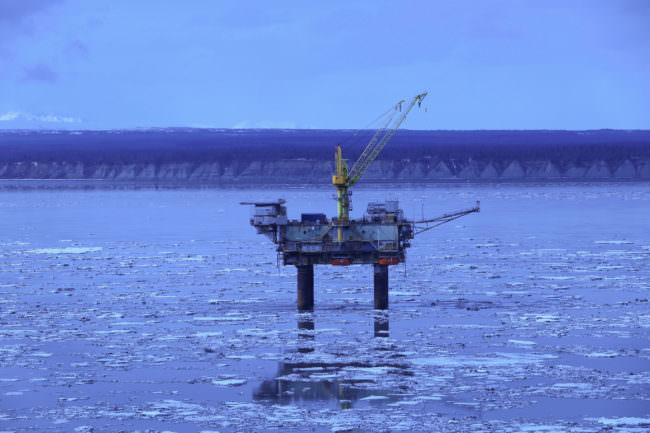
Hilcorp snapped up more than 100,000 acres in Cook Inlet for additional oil and gas development at federal and state lease sales held Wednesday.
The federal Bureau of Ocean Energy Management offered over 1 million acres in the Inlet for lease. The agency’s last three Cook Inlet lease sales were canceled when the oil industry wasn’t interested in developing there.
But at this year’s federal sale, Hilcorp submitted over $3 million in bids. The private, Texas-based company is the Inlet’s predominant oil and gas producer.
The company picked up 76,615 acres at the federal lease sale and 26,822 acres at the state lease sale. In both sales, Hilcorp was the only bidder.
David Johnston, who oversees leasing in the region for the Bureau of Ocean Energy Management, said on a call with reporters that he wasn’t surprised to see Hilcorp’s interest.
“Hilcorp, as you know, has been very active in the upper Cook Inlet,” Johnston said. “I think this is just kind of a natural extension for Hilcorp to be looking in the southern end of the Inlet.”
Vincent DeVito, who advises the Interior Secretary on energy policy, added that he thinks the Trump administration’s more industry-friendly policies also influenced the results.
“We are focused on Alaska energy, and… the signaling that has been coming out of this administration is also catalyzing the optimism,” Devito said on the call.
Not everyone is happy about the lease sale results. In a statement, watchdog environmental group Cook Inletkeeper said the federal lease sale marked “a turning point” for Cook Inlet.
“For the first time ever, we are pushing oil and gas platforms and infrastructure into the heart of our commercial and sport fishing and tourism economies,” Cook Inletkeeper’s Bob Shavelson said.
Earlier this year, a gas leak from a fuel line powering one of Hilcorp’s oil platforms went on for months before it could be repaired, drawing intense criticism from Cook Inletkeeper and other environmental groups.
Elizabeth Harball is a reporter with Alaska's Energy Desk, covering Alaska’s oil and gas industry and environmental policy. She is a contributor to the Energy Desk’s Midnight Oil podcast series. Before moving to Alaska in 2016, Harball worked at E&E News in Washington, D.C., where she covered federal and state climate change policy. Originally from Kalispell, Montana, Harball is a graduate of Columbia University Graduate School of Journalism.




